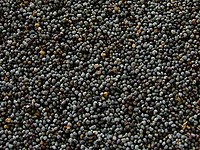
Photo from wikipedia
Strawberry (SB), black currant (BC), and raspberry seed (RB) residues were used in 3 experiments to study their effects on ruminal fermentation, methane concentration, and fatty acid (FA) proportions in… Click to show full abstract
Strawberry (SB), black currant (BC), and raspberry seed (RB) residues were used in 3 experiments to study their effects on ruminal fermentation, methane concentration, and fatty acid (FA) proportions in the ruminal fluid and milk of dairy cows. Initially, a batch fermentation in vitro study (experiment 1) was performed to investigate the effects of the 3 berry residues on basic ruminal fermentation parameters. Total volatile fatty acid concentrations, including acetate, propionate, and butyrate, increased in the BC group compared with other treatments. Based on the preliminary in vitro results, 2 consecutive in vivo experiments were conducted using 4 Polish Holstein-Friesian cows fitted with rumen cannulas (experiment 2) and 30 lactating Polish Holstein-Friesian dairy cows (experiment 3) in a replicated 2 × 2 crossover design. Cows in both experiments received a partial mixed ration (PMR) in 2 variants: (1) a control diet of PMR + 2 kg of concentrate (control); (2) PMR + 2 kg of BC seed residues (BC). The BC diet did not mitigate ruminal methane production. Ruminal fermentation (experiment 2) was not affected by the BC diet; however, the concentrations of C18:1 trans-11 and C18:2 cis-9,trans-11 increased significantly by 91 and 131%, respectively. Likewise, concentrations of total trans C18:1 and total monounsaturated FA in ruminal fluid were increased significantly by BC seed residues. In experiment 3, BC significantly increased milk fat C18:1 trans-11, C18:2 cis-9,trans-11, n-3, n-6, and polyunsaturated FA concentrations without affecting milk production performance. In conclusion, the amount (2 kg/d) of BC used in this study did not adversely affect ruminal fermentation or milk production and composition. However, using BC increased proportions of unsaturated FA and conjugated linoleic acid in milk. Although dietary BC did not exert a strong methane inhibition effect, it could represent an inexpensive alternative concentrate to improve beneficial FA in milk without negative effects on rumen fermentation and production parameters in dairy cows. Incorporation of berry seed residues in diets would be profitable economically and nutritionally for dairy cattle production.
Journal Title: Journal of dairy science
Year Published: 2019
Link to full text (if available)
Share on Social Media: Sign Up to like & get
recommendations!